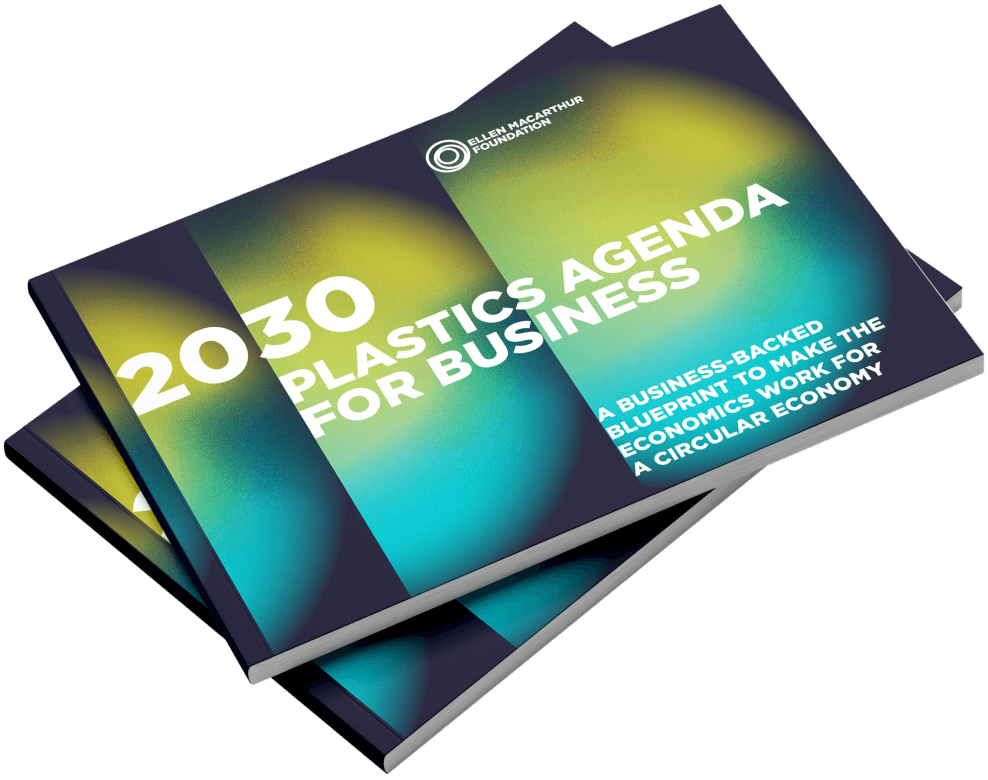The circular economy is widely recognised as the way to address plastic waste and pollution, while delivering economic, environmental and social benefits.
Plastic packaging is one of the most iconic examples of the linear economylinear economyAn economy in which finite resources are extracted to make products that are used - generally not to their full potential - and then thrown away ('take-make-waste'). — fossil-based, single-use, short-lived, with very low recycling rates and high rates of mismanaged waste and pollution — and despite momentum, the problem is still getting worse, making it a priority in the circular economycircular economyA systems solution framework that tackles global challenges like climate change, biodiversity loss, waste, and pollution. It is based on three principles, driven by design: eliminate waste and pollution, circulate products and materials (at their highest value), and regenerate nature. transition.
Our Plastics Mission is focused on tackling the barriers to circular economy implementation at scale. We have identified three systemic barriers to prioritise:
Scaling reusereuseThe repeated use of a product or component for its intended purpose without significant modification.
Addressing flexible plastic waste
Developing collection and recycling infrastructure
We work with businesses, governments, waste pickers, philanthropy, NGOs, and academia on solutions for these barriers.



A business agenda to 2030
The Ellen MacArthur Foundation has rallied leading businesses behind an evidence-based, practical 2030 agenda built on a decade of action. It looks beyond companies’ efforts on their own footprints, to how they can collectively shape wider market conditions.
The 2030 Plastics Agenda for Business identifies priority actions for businesses to take and highlights the importance of moving from individual business action to collaborative action and collective advocacy for circular economy policy. It has three pillars:
Collective advocacy: Businesses proactively calling for ambitious and effective regulation.
Collaborative action: To overcome challenges that individual businesses cannot overcome alone.
Individual action: Businesses continuing driving change in the areas they do control.
More than 1,200 businesses and organisations are united behind a shared circular economy vision. 300+ businesses have joined the Business Coalition for a Global Plastics Treaty and an initial group of businesses representing about 20% of the global plastic packaging market have (re)committed to drive aligned individual action as part of the Global Commitment 2030.
Plastics policy and collective advocacy
Government policy is essential to the circular economy transition. Policy gaps and current economics prevent the scaled circular economy implementation necessary to eliminate plastic waste and pollution. The Ellen MacArthur Foundation works directly with governments around the world to inform policy efforts, and aligns its business network around calls for ambitious, effective, and harmonised policy. Examples include the Business Coalition for a Global Plastics Treaty and our EPR statement.
How do we rethink plastics in a circular economy?
To rethink plastics in a circular economy, there are three core actions:
Eliminate all problematic and unnecessary plastic items
Innovate to ensure that the plastics we do need are reusable, recyclable, or compostable
Circulate all the plastic items we use to keep them in the economy and out of the environment
The Ellen MacArthur Foundation has developed a six-point vision for plastic packaging in a circular economy, supported by over 1,000 organisations:
Elimination of problematic or unnecessary plastic packaging through redesign, innovation, and new delivery models is a priority.
Reuse models are applied where relevant, reducing the need for single-use packaging.
All plastic packaging is 100% reusable, recyclable, or compostable.
All plastic packaging is reused, recycled, or composted in practice.
The use of plastic is fully decoupled from the consumption of finite resources.
All plastic packaging is free of hazardous chemicals, and the health, safety, and rights of all people involved are respected.

Apply to join our Plastics Network
Join 1200 organisations united behind a shared vision of a circular economy.








